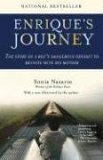Summary | Excerpt | Reading Guide | Reviews | Beyond the Book | Readalikes | Genres & Themes | Author Bio

Others in the neighborhood go door-to-door, offering to burn household trash for change. One afternoon, three
children, ages eight to ten, line up in front of their mother, who loads them down with logs of wood to deliver.
"Give me three!" one boy says. She lays a rag and then several pieces of wood atop his right shoulder.
In one neighborhood near where Enrique's mother grew up, fifty-two children arrive at kindergarten each morning. Forty-four arrive barefoot. An aide reaches into a basket and places a pair of shoes into each
one's hands. At 4 P.M., before they leave, the children must return the shoes to the basket. If they take the shoes home, their mothers will sell them for food.
Black rats and a pig root around in a ravine where the children play.
At dinnertime, the mothers count out three tortillas for each child. If there are no tortillas, they try to fill their
children's bellies with a glass of water with a teaspoon of sugar mixed in.
A year after Enrique goes to live with his uncle, Lourdes calls – this time from North Carolina.
"California is too hard," she says. "There are too many immigrants." Employers pay poorly and treat them badly. Even with two jobs, she
couldn't save. She has followed a female friend to North Carolina and started over again. It is her only hope of bettering her lot and seeing her children again. She sold everything in California– her old Ford, a chest of drawers, a television, the bed she shares with her daughter. It netted $800 for the move.
Here people are less hostile. She can leave her car, even her house, unlocked. Work is plentiful. She quickly lands a job as a waitress at a Mexican restaurant. She finds a room to rent in a trailer home for just $150 a month
– half of what the small garage cost her in Los Angeles. She starts to save. Maybe if she amasses $4,000, her brother Marco will help her invest it in Honduras. Maybe
she'll be able to go home. Lourdes gets a better job on an assembly line for $9.05 an hour
– $13.50 when she works overtime.
Going home would resolve a problem that has weighed heavily on Lourdes: Diana's delayed baptism. Lourdes has held off, hoping to baptize her daughter in Honduras with Honduran godparents. A baptism would lift
Lourdes's constant concern that Diana's unexpected death will send her daughter to purgatory.
Lourdes has met someone, a house painter from Honduras, and they are moving in together. He, too, has two children in Honduras. He is kind and gentle, a quiet man with good
manners. He gives Lourdes advice. He helps ease her loneliness. He takes Lourdes and her daughter to the park on Sundays. For a while, when Lourdes works two restaurant jobs, he picks her up when her second shift ends at 11 P.M., so they can share a few moments together. They call each other
"honey." They fall in love.
Enrique misses Lourdes enormously. But Uncle Marco and his girlfriend treat him well. Marco is a money changer on the Honduran border. It has been lucrative work, augmented by a group that for years has been in constant need of his services: U.S.-funded Nicaraguan contras across the border.
Marco's family, including a son, lives in a five-bedroom house in a middle-class neighborhood of Tegucigalpa. Uncle Marco gives Enrique a daily allowance, buys him clothes, and sends him to a private military school in the evenings.
By day, Enrique runs errands for his uncle, washes his five cars, follows him everywhere. His uncle pays as much attention to him as he does his own son, if not more. Often, Marco plays billiards with Enrique. They watch movies together. Enrique sees New York
City's spectacular skyline, Las Vegas's shimmering lights, Disneyland's magic castle. Negrito, Marco calls
Enrique fondly, because of his dark skin. Marco and Enrique stand the same way, a little bowlegged, with the hips tucked forward. Although he is in his teens, Enrique is small, just shy of five feet, even when he straightens up from a slight stoop. He has a big smile and perfect teeth.
Excerpted from Enrique's Journey by Sonia Nazario Copyright © 2006 by Sonia Nazario. Excerpted by permission of Random House, a division of Random House, Inc. All rights reserved. No part of this excerpt may be reproduced or reprinted without permission in writing from the publisher.




The secret of freedom lies in educating people, whereas the secret of tyranny is in keeping them ignorant
Click Here to find out who said this, as well as discovering other famous literary quotes!
Your guide toexceptional books
BookBrowse seeks out and recommends the best in contemporary fiction and nonfiction—books that not only engage and entertain but also deepen our understanding of ourselves and the world around us.